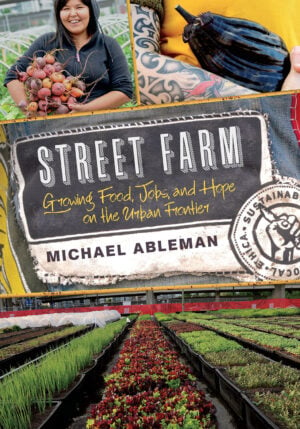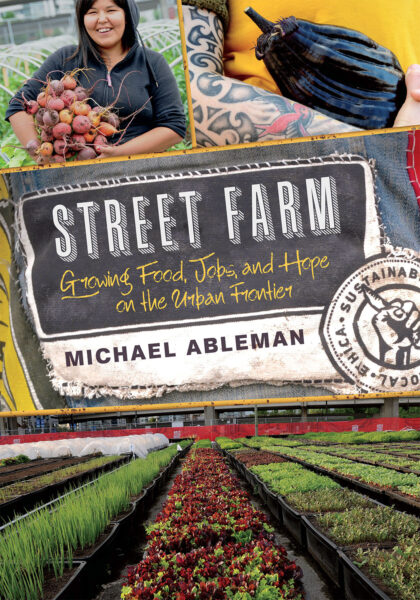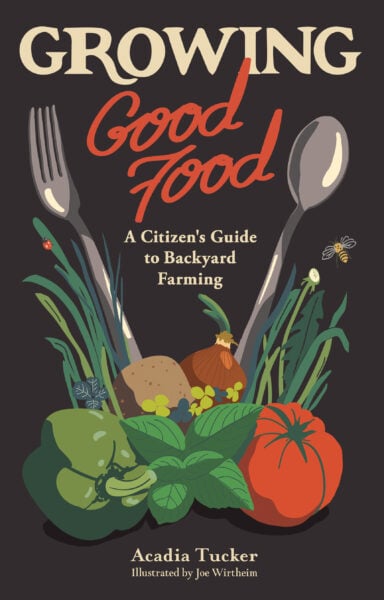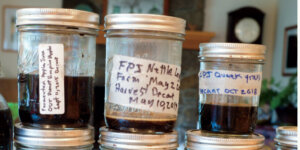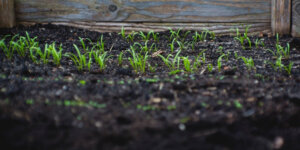We are Farmily: Everyday Life on Sole Food Street Farm
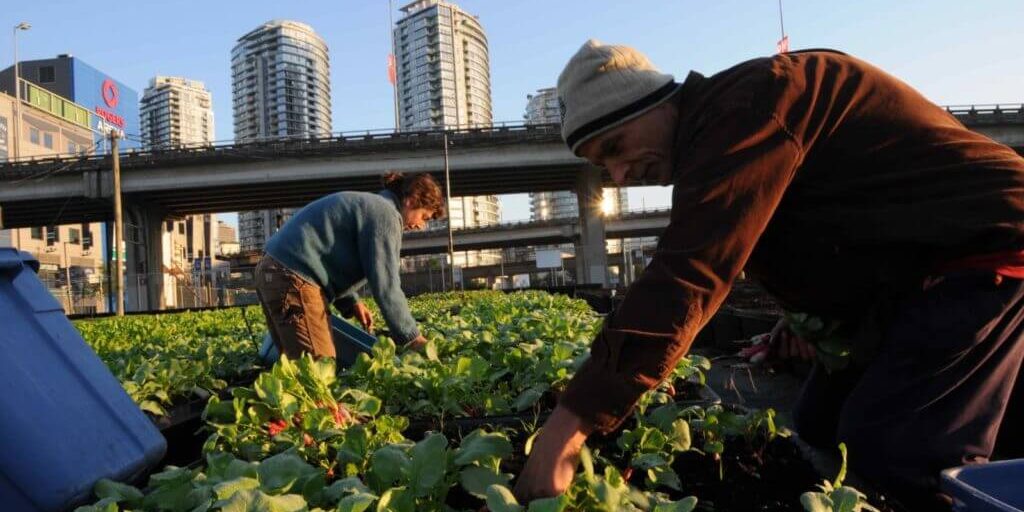
Food is the medium. The message is nourishment in its most elemental and spiritual form.
That’s how author Michael Ableman sees the role of Sole Food Street Farm and the food it sells to markets, restaurants, and individuals.
In the following excerpt from his new book, Street Farm: Growing Food, Jobs, and Hope on the Urban Frontier, he explains how the notion of “farmily” plays out in his tight-knit crew of staff at Sole Food Street Farms in Vancouver.
You can read more excerpts from Street Farm on our book page, as well as Albeman’s urban food manifesto.
Prefer Audio?
Listen to the following excerpt from the audiobook for Street Farm:
Our work in the markets, and supplying them, has, over the years, highlighted in unique ways the struggle we face in balancing our social agenda with our agricultural one. It’s not only the public who asks, What is Sole Food? In many ways, our two primary goals—to provide meaningful employment to individuals who have challenges and to create a credible model of production urban agriculture—rub up against each other and can be contradictory. While we try to harmonize the two conflicting goals, I suspect that this conflict is a reality that will always be there. Still, we work hard on the problem. And we’ve got a hard worker who spends a great deal of time trying to figure it out.
We hired Lissa Goldstein in 2012 when we were expanding the project, as site manager for the farm at Pacific and Carrall. Seann and I conducted a job interview with her via Skype, both peering into his iPhone while standing at our Astoria farm as she smiled out at us from the East Coast of the United States. I could barely hear above the din of traffic or see through Seann’s shattered phone screen, but what came through was that this Dartmouth-educated young woman was strong, supersmart, and solid in her intent and had a few years of both farming and community development experience.
Perhaps more than anyone else at Sole Food, Lissa has come to know there is a fine line between providing real opportunities for people to learn new skills and get healthy and pandering to a sense of entitlement that exists among some people in this community where social service agencies are so abundant. How much can we expect from our staff with the challenges they have? How much is realistic for them to expect from us and from the organization? In her role as director of operations, Lissa feels these contradictions acutely. She now holds the responsibility of the day-to-day management of our staff and farms. And it’s there—in the rows, under pressure, facing the elements—where the challenges most often appear. The devil is always in the dirty details.
“Most places, all employees are treated alike, but it does not work that way in this job,” Seann reminds me. “Some guy is suicidal and another person is having anxiety issues, one is doing heroin, and another doing crack. Their personal stories play out so much in the workplace.”
After a week of rain at the end of June 2013, the temperature rose to the mid-eighties and stayed that way. Our radishes took off, with six or seven beds maturing weekly instead of the usual three. We were selling 350 bunches of radishes every weekend, which meant we were picking a lot of radishes. On the parking lot there was no respite from the heat. There was no cool house to retreat to for a power nap, only the urgency of getting those radishes out of the beds and into a cooler. And Lissa felt the heat too, of course—plus more. She tells me, “I always feel like my anxiety skyrockets in these situations because we have staff for a limited number of hours in the day and four hundred radishes to pick before it gets too hot.”
One morning in the midst of this rush, when by 7 am the sun was already oppressively hot and Lissa was already feeling the stress, Donna approached her to ask about holiday pay, of all things. The timing seemed off, and Lissa responded, “Yes, you’re going to get it, but we don’t actually have to pay for holidays.” The information was more than Donna needed—“Yes,” would have sufficed, Lissa admits—and Donna grew angry. The discussion quickly deteriorated into an argument and then tears.
It seemed that something had been building in Donna. And as the argument settled, she pointed out that since she’d first been hired, many of the employment-support pieces of Sole Food had disappeared—the staff meetings and farm walks, especially. To her, the focus seemed to be exclusively on production. For Lissa, this was a really difficult situation. As she tells me, “I was forced to deal with my vulnerability, the stress of a large staff, and the difficulty of balancing commercial farming with real supportive employment. I was also forced to deal with the real question of what Donna was saying. What had gone wrong? How could we balance these two things better?”
This collision forced us to look at what was missing. In late summer 2013 we initiated more regular staff meetings and check-ins. Around the same time, an employee representative was elected by the staff and started attending manager meetings and reporting back to the staff. These seem like small changes, but they were, in the end, profound. They allowed everyone to participate more fully in how things were run. (…)
As a business, Sole Food Street Farms has grown, and today we are respected in the community. Our products are not the cheapest, but the quality is excellent, and our staff carries a level of pride in what they have accomplished and who we are in the neighborhood. We have never had a goal of trying to change anyone; we just wanted to create a stable enterprise that can provide meaningful work year after year. Unlike many social service agencies, we don’t train people and move them on. We are proud to have several people who started with us seven years ago still involved. Just as in any work environment, to be successful everyone needs to feel fulfilled and excited to be at work. The best fertilizer is the farmer’s footsteps on the field. When the farmers are happy the food tastes better.
Happiness is not a constant, of course, and we must admit where we’ve fallen short. Not everyone always feels fulfilled. While much energy has gone into supporting the staff who come from the neighborhood, those of us who are not Downtown Eastside residents—Seann, Kelsey, Lissa, our office manager Tabitha Mcloughlin, me—sometimes we fall through the cracks. The founders and the core management team are holding a lot together. Often our work is behind the scenes, less visible, and burnout can creep in unexpectedly.
It is fairly common for founders of an organization to find themselves filling roles that no longer allow them to do the very work that inspired them to begin with. Seann, for instance, does all kinds of tasks that are essential but invisible, and I know he has experienced, as have I, a kind of disconnection from the daily work with the crew. Lissa is on the farms every day guiding the crew and the agricultural operations, and, as she experienced with Donna, that comes with its own complicated pressures and disappointments and sometimes tears. Tabitha, whom we brought on in 2013 to do bookkeeping, communications, and events, and to look after the millions of details that we could no longer keep up with, is in the office doing administrative work. “We are so focused on creating this environment,” Seann says, “but as you move up and you are looking for feedback and you can’t get it or you don’t have a peer group, it’s hard for all of us.”
As with almost every aspect of life and community, solving problems comes down to communication. When the five of us get together to talk and we can discuss our personal challenges, we tend to feel better. We remind each other not to separate ourselves from those we are trying to support. And yet sometimes, our responsibilities do separate us, and speaking from personal experience, this can wear a person down.
Seann and I have considered Sole Food becoming a worker-owned business, which would take a lot of the pressure and expectation off us. “But,” he admits, “it’s a double-edged sword. Our staff wants more responsibility, they want to be held accountable, but sometimes when you do hold them accountable they bristle. We are supposed to be here for each other.” Seann is not alone in expressing these occasional frustrations. But just as soon as we identify a problem, we’re reaching for solutions. As Seann says, “This project has been successful because it has been built on the backs of Downtown Eastside residents as the core and reason for the project. As soon as you take each other or any of the work for granted, it falls apart.”
Sole Food’s commitment to open communication, about the good and the bad, our trials and errors, is the best reminder that it takes all of us—founders, managers, staff, and the whole community—to make this work. I won’t lie; acknowledging our weak points, having them revealed to us by our co-workers, has been difficult, but personal reflection and learning how to live with one another is what we are here to do.
We talk about balance on our farms and at our markets, but what does it really mean? I’ve learned in my life as a farmer, an employee, and an employer that perfection cannot be the goal, and as such we will always be asking ourselves difficult questions. We will never have all of the answers. We must accept that we can never get comfortable. The human aspect of our work is just like the agricultural aspect of our work; it is always changing and evolving, and it will always require a beginner’s mind—a willingness to see things anew—to work with it.
Recent Articles
Everyone loves a refreshing, fermented, nutritious drink…even your garden! Take your fermentation skills out of the kitchen and into the garden by brewing fermented plant juice. The following is an excerpt from The Regenerative Grower’s Guide to Garden Amendments by Nigel Palmer. It has been adapted for the web. How to Make Fermented Plant Juice Fermented…
Read MoreWant to see your crops thrive this upcoming growing season? The key is in soil fertility and health. Spend time maintaining your soil’s health to guarantee bigger and better crops come harvest time! The following is an excerpt from No-Till Intensive Vegetable Culture by Bryan O’Hara. It has been adapted for the web. What Is Soil Fertility?…
Read MoreMany know the effects of catnip on our feline friends, but few realize that catnip has medicinal effects for humans. From stomach aches to reducing fevers, catnip is a versatile herb with many benefits. The next time you grow this plant for your cat you may end up taking a few cuttings for yourself! The…
Read MoreIt’s time to take control of your seeds and become a plant breeder! Saving your seed allows you to grow and best traditional & regional varieties, and develop more of your own. The following excerpt is from Breed Your Own Vegetable Varieties by Carol Deppe. It has been adapted for the web. Becoming A Plant…
Read MoreWhether you’re looking to replace your end-of-the-day cocktail, relax before bed, or want something new to add to your tea, this non-alcoholic mocktail syrup base will do the trick. Delicious and all-natural, take a sip of this nightcap mocktail and feel your troubles melt away. The following is an excerpt from Herbal Formularies for Health…
Read More

